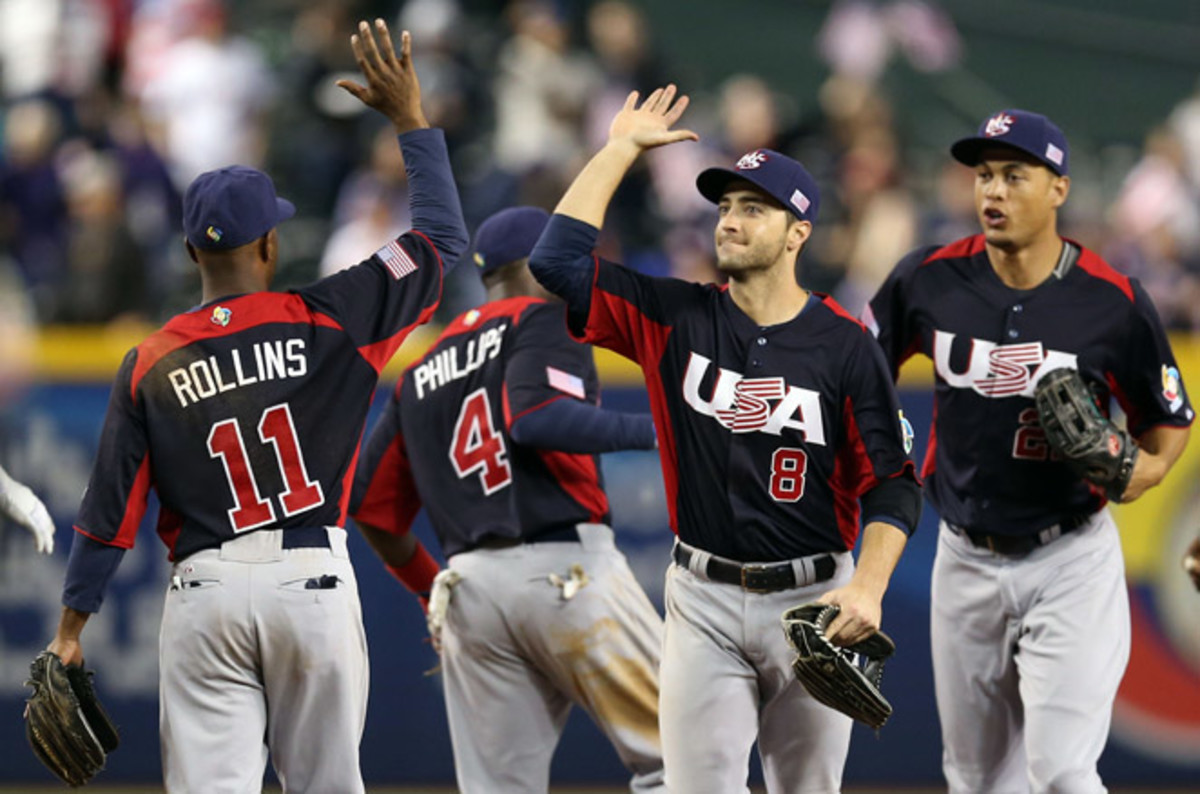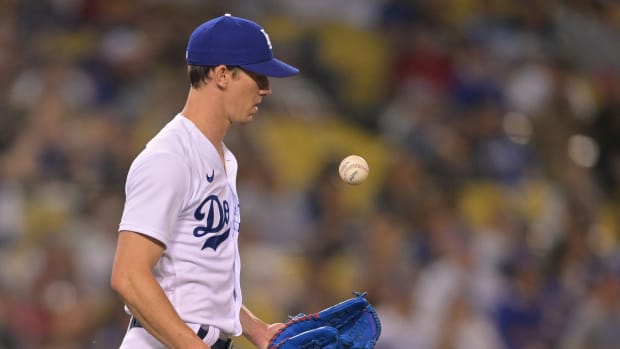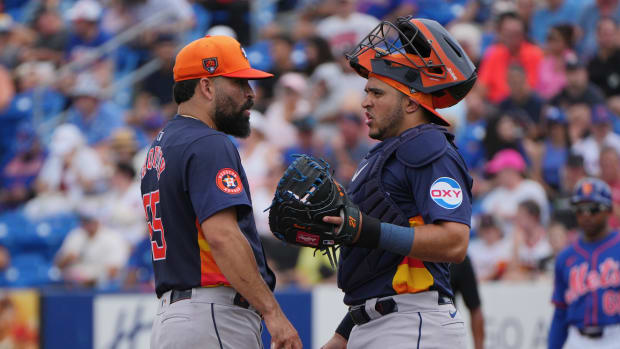
U.S. win over Italy sets up showdown with Canada at WBC

Ryan Braun (center) and the U.S. need a win Sunday against Canada to stay alive in the WBC.
Christian Petersen/Getty Images
David Wright had a hop in his step. His fifth-inning grand slam to break open a close game Saturday night in the World Baseball Classic brought out the inner Cody Ross in him. The normally placid Wright admired his shot and then gave one of those boy-that-was-fun hops as it sailed out of the park. This is what can happen when you play for the heavily favored USA and you are playing for your WBC lives against Italy. Yes, the USA sweated out a come from behind win over Italy, 6-2.
It was a day at Chase Field that once again proved the WBC is, despite its critics, an intense competition in which emotions run high. USA starting pitcher Ryan Vogelsong, fresh off a World Series championship with the Giants, said, "It's definitely a postseason atmosphere ... It was everything I thought it was going to be. The adrenaline was going really well."
Just hours earlier on the same field, Canada brought new meaning to that old line about going to a fight and a hockey game breaking out. The Canadian team and Mexico engaged in an honest-to-goodness brawl, precipitated by a couple of huckleberries on Mexico having no clue about the WBC rules.
"It's hockey night in Canada," cracked Canada first base coach Larry Walker. "Don Cherry can't wait to get on the air."
That brings us to the best day in the tournament so far: today the United States plays Canada with not just a trip to the second round in Miami on the line. If the U.S. wins, it finishes in first place in the pool and moves on. If it loses, it finishes in last place. And as a last place pool finisher -- under current rules -- Team USA would not get an automatic bid to the 2017 WBC, but instead would have to win its way through a qualifier in November of 2016.
This would be like sending Tiger Woods to a local qualifier to gain entry into the US Open.
You think you have trouble now getting Major Leaguers to sign up for the WBC? Imagine trying to recruit guys for the next WBC, and telling them that first, soon after the 2016 World Series, they would have to play in and win a modified double elimination tournament -- maybe even in Germany, the way Canada had to qualify for this one.
Good luck with that. Maybe Mike Trout, who didn't want to play in this one but showed up as a fan, would rather buy a ticket for the next one, too.
Of course, the WBC could "amend" the current qualifying rules -- the ones used in the 2009 WBC -- between now and then. (What kind of tournament doesn't have the qualifying rules firmly established before the tournament, anyway?)
The administration of the tournament can make you shake your head sometimes, what with MLB, the Players Association, the International Baseball Federation and just about anybody else with a suit, a tie and an idea involved in the running of the tournament.
You can waste an entire afternoon and evening, for instance, reading the WBC rules and protocols posted online. But guess what: though seemingly written by Herman Melville, they offer no provisions on how to handle ejections. Are ejected players ineligible for the following game, as happens in other international sporting events? We don't know. The WBC doesn't know. So when three Canadian players were ejected for their actions in the brawl with Mexico -- and video review leaves others in position to receive discipline -- there was no official determination about their status for the USA game. (A player from Canada who was not ejected, for instance, fired a bottle back into the stands after a fan hit pitching coach Denis Boucher with it.)
The brawl was a monument to stupidity, with the Mexican team upset that Chris Robinson bunted to start the ninth inning with his team ahead by six runs. You don't do it league play, but in the WBC, where every run is precious, you never stop trying to score or defend.
As Canada Ernie Whitt put it well, "You play every inning as if it's 0-0."
In 2006, the Canadians were bounced from pool play because of run differential, even though they beat Team USA. One piece of advice: know the rules before the tournament.
Immediately, some people began howling about changing the rules so as not to encourage "running up scores." How about people simply knowing the rules? This is professional baseball, anyway, not elementary school soccer where everybody gets a ribbon. That the games are played hard from the first inning to the last is a good thing that doesn't need to be changed because a couple of guys didn't know the rules.
Of course, the tournament, now in its third iteration, could use some fixes. For instance, Mexico actually had been eliminated with its loss to Canada, but the tiebreaker rules are so ridiculous and illogical that tournament officials either weren't aware of it, refused to acknowledge it or didn't have the necessary computer power on hand to crunch the numbers. If Team USA lost to Italy and beat Canada, then Mexico, the U.S. and Canada all would have been 1-2. The three-way tie is broken by something called Team Quality Balance.
I am not making up this definition of what is referred familiarly in the WBC as the almighty "TQB:" you divide runs scored by innings played on offense, then subtract runs allowed divided by innings played on defense. Do the math and Mexico is left with a TQB of negative-.222.
Are you kidding me? This is how you expect fans to follow a tournament? By giving them math problems? By assigning teams negative fractional values to see who advances? Why not, next to the colorful caps and jerseys at the souvenir stands, include official WBC calculators so everybody can play along?
Can you imagine Joe Torre, USA manager, turning to Larry Bowa, his bench coach, in the middle of the game and asking him to calculate the team's up-to-date TQB? The tiebreaker rules for pool play run 17 paragraphs.
Ah, but in spite of the bureaucracy, the heartbeat of this tournament is the passionate play -- and that heartbeat is a rapid one. Think about the three biggest complaints fans level against ballplayers: they get paid too much money, they don't play hard all the time and they're not loyal.
So here we get the WBC, in which the players are not paid (other than a relatively nominal stipend), they play so hard that a guy Saturday night started a brawl by being accused of playing too hard, and they are playing out of loyalty to their country, when the easy thing for these guys would be to spend another lazy day in camp fielding fungoes and going through the motions of another vapid Spring Training game.
This is Christmas in March for a baseball fan. Sunday we get Canada, coming off a brawl, against the U.S., trying to avoid the shame of being sent to a qualifier in some such place as Remsenberg, Germany. It's win or go home. "Game 7," as Torre put it. The rules don't matter. The tiebreakers don't matter. The TBQ doesn't matter. You don't need a calculator. It's one win-or-go-home game. At any time of year, in any league, in any ballpark, it needs no translation.


































